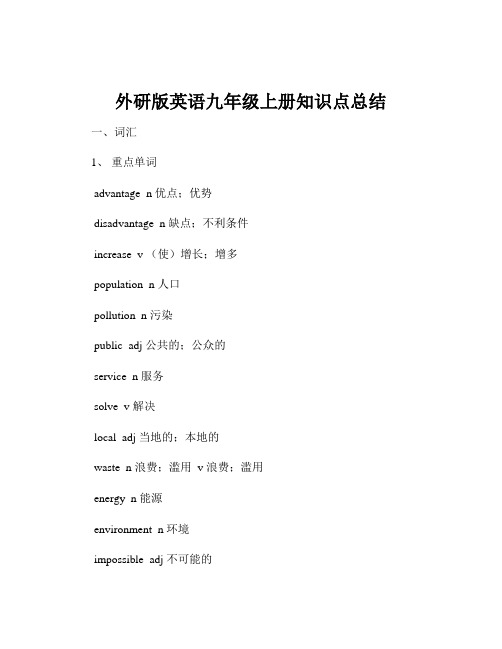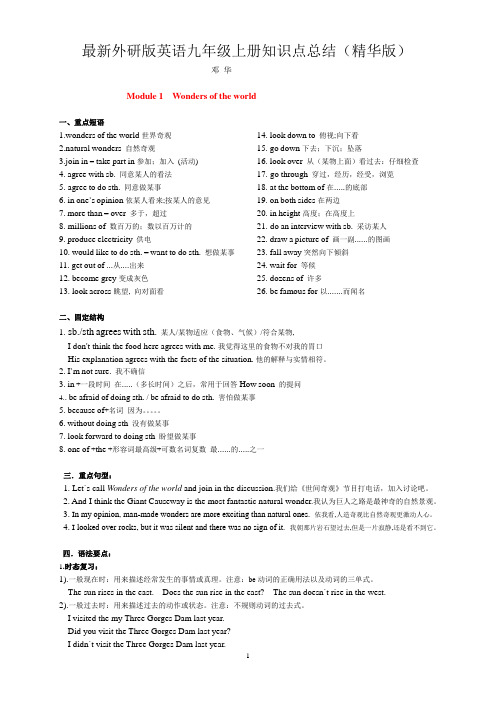外研版九年级英语上册知识点整理
- 格式:docx
- 大小:49.24 KB
- 文档页数:40

外研版英语九年级上册知识点总结一、词汇1、重点单词advantage n 优点;优势disadvantage n 缺点;不利条件increase v (使)增长;增多population n 人口pollution n 污染public adj 公共的;公众的service n 服务solve v 解决local adj 当地的;本地的waste n 浪费;滥用 v 浪费;滥用energy n 能源environment n 环境impossible adj 不可能的possible adj 可能的communication n 交流;交际 compare v 比较culture n 文化tradition n 传统especially adv 尤其lately adv 最近;近来2、短语at the moment 目前;现在in the past 在过去too much 太多make progress 取得进步hundreds of 数以百计的thousands of 数以千计的look after 照顾;照看look for 寻找be proud of 为……感到骄傲be good at 擅长be weak in 在……方面弱be afraid of 害怕hear from 收到……的来信asas 和……一样not asas 不如……a bit 有点儿in fact 事实上get on well with 与……相处融洽二、语法1、一般过去时一般过去时表示过去某个时间发生的动作或存在的状态,常与表示过去的时间状语连用,如 yesterday, last week, ago 等。
动词的过去式分为规则变化和不规则变化,规则变化通常在动词后加 ed,不规则变化需要特殊记忆。
2、现在完成时现在完成时表示过去发生的动作对现在造成的影响或结果,或者过去的动作一直持续到现在。
构成:have/has +过去分词常与 already, yet, just, ever, never 等词连用。

外研版初三英语九年级上册知识点总结归纳M o dule 1一、重点短语1.从……出来ge t ou t o f...2.在……的顶上on top of...3.期望…… look forward t o...4.穿过go through5.朝……望过去look acr oss6.同意agree wi th7.在我看来in my op in ion8.多于more than9.无数的mil l ions o f10.加入jo in in二、重点句型1. be no t su re...对……不确定2. There be noth ing to do...没有什么可以……3. There be no s ign of...……没有迹象4.I th ink...我认为……5.It’s about...wide and...h i gh.大约多宽多高。
三、重点语法Module 2一、重点短语1.……末尾the end of2.去野餐have a p icn ic3.摆餐桌lay the t ab le4.聚在一起ge t toge ther5.倒数count down6.取决于depend on7.一……就…… as soon as8.对……表示感谢give t hanks fo r...9.大量plen t y of10.……的开始the s ta r t o f...11.也as well12.度假take a vaca t ion二、重点句型1.I t i s a t ime fo r...是……的时候了。
2.I s the re anyth ing spec ia l...?……有什么特别的事情吗?3.t each sb how to do...教某人怎样做……4.I hope tha t...我希望三、重点语法(一)不同身份1.表示主从句的动作同时发生或几乎同时发生时,这类连词(组)有:when, whi le, as soon as。

最新外研版英语九年级上册知识点总结(精华版)邓华Module1 Wonders of the world一、重点短语1.wonders of the world世界奇观2.natural wonders自然奇观3.join in = take part in参加;加入(活动)4.agree with sb.同意某人的看法5. agree to do sth.同意做某事6.in one’s opinion依某人看来;按某人的意见7.more than = over多于,超过8. millions of数百万的;数以百万计的9.produce electricity供电10.would like to do sth. = want to do sth.想做某事11.get out of...从....出来12.become grey变成灰色13.look across眺望, 向对面看14.look down to俯视;向下看15.go down下去;下沉;坠落16.look over从(某物上面)看过去:仔细检查17. go through穿过,经历,经受,浏览18.at the bottom of在.....的底部19.on both sides在两边20.in height高度;在高度上21. do an interview with sb.采访某人22.draw a picture of画一副......的图画23.fall away突然向下倾斜24.wait for等候25.dozens of许多26.be famous for以.......而闻名二、固定结构1. sb./sth agrees with sth.某人/某物适应(食物、气候)/符合某物,I don't think the food here agrees with me. 我觉得这里的食物不对我的胃口His explanation agrees with the facts of the situation.他的解释与实情相符。

外研版英语九年级上册知识点总结最新外研版英语九年级上册知识点总结Module 1Wonders of the world短语归纳1.wonders of the world世界奇观natural wonders自然奇观man-made wonders人造奇观2.join in参加;加入(活动) = take part in3.I’m not sure.我不确信4.agree with sb.同意某人的看法XXX.某人适应(食物、气候)agree to do XXX同意做某事XXX)同意/赞成XXX.( plan/)在……方面意见一致5.on the XXX。
在。
的东海岸6.XXX据或人看来;按或人的意见7.more than = over多于,跨越XXX供电lions of数百万的;数以百万计的10.would like to do sth。
= want to do sth.想做某事XXX.想要某人做某事11.early morning大清早12.XXX变成灰色13.get out of。
从。
出来14.go through意为“穿过,夸大从物体内部穿过”;重新至尾的操演15.fall XXX忽然向下倾斜16.look over从(某物上面)看过去:仔细检查look across远望look down to俯视;向下看24.wait for等候25.dozens of许多26.in height高度;在高度上用法集萃1.XXX XXX同意某人agree to do XXX同意做某事2.would like to do XXX想要做某事4.XXX以及have been in的区别5.because of+名词因为。
6.XXX没有做某事7.XXX.害怕做某事19.look forward to doing XXX盼望做某事Module 2Publicholidays发给中央短语归纳1.since then从那当前2.have a three-day holiday有三天的假期3.public holiday公众假日4.have one day off有一天的休息时间5.all kinds of各种各样的6.XXX度假介词短语:XXXHe is going to take a vacation to Beijing。

九年级英语上册知识点总结Module1 Wonders of the world一、重点短语1.wonders of the world世界奇观2.natural wonders自然奇观3.join in = take part in参加;加入(活动)4.agree with sb.同意某人的看法5. agree to do sth.同意做某事6.in one’s opinion依某人看来;按某人的意见7.more than = over多于,超过8. millions of数百万的;数以百万计的9.produce electricity供电10.would like to do sth. = want to do sth.想做某事11.get out of...从....出来12.become grey变成灰色13.look across眺望, 向对面看14.look down to俯视;向下看15.go down下去;下沉;坠落16.look over从(某物上面)看过去:仔细检查17. go through穿过,经历,经受,浏览18.at the bottom of在.....的底部19.on both sides在两边20.in height高度;在高度上21. do an interview with sb.采访某人22.draw a picture of画一副......的图画23.fall away突然向下倾斜24.wait for等候25.dozens of许多26.be famous for以.......而闻名二、固定结构1. sb./sth agrees with sth.某人/某物适应(食物、气候)/符合某物,I don't think the food here agrees with me. 我觉得这里的食物不对我的胃口His explanation agrees with the facts of the situation.他的解释与实情相符。

Module 1 Wonders of the world一、知识点梳理1. Which two are natural wonders?wonder /'wʌndə/n.奇观;奇迹例:We all know the Great Wall is an ancient wonder. 众所周知,长城是古代奇观。
【考点】wonder n.奇迹;奇观wonderful adj.令人惊奇的;奇妙的wonderfully adv.令人惊奇地;很好地【重难点】①(It's) no wonder 难怪;并不奇怪;当然例:No wonder he is not hungry; he has been eating sweets all day. 难怪他不饿,他整天在吃糖果.①wonder vi(常与at,that连用)觉得奇怪;惊奇例:I wonder at his rudeness. 我对他的粗鲁感到奇怪.①wonder vt纳闷;想知道例:He wondered why people built ugly homes, when they could have beautiful ones. 他很奇怪为什么人们本可以造出漂亮的房屋,而偏偏建造出丑陋的房子来.I wonder why James is always late for school. 我想知道为什么詹姆斯上学总是迟到.2. Let's call Wonders of the World and join in the discussion.discussion/dɪ'skʌʃn/n.讨论;商讨例:I knew how to do it after the discussion. 讨论后我知道该怎么做了。
【考点】discussion的动词形式为discuss。
have a discussion with sb. 意为“和某人讨论”。
外研版九年级英语上册知识点归纳总结外研版九年级英语上册知识点归纳总结一. 介词by的用法1. 意为“在……旁”,“靠近”。
Some are singing and dancing under a big tree. Some are drawing by the lake.有的在大树下唱歌跳舞。
有的在湖边画画儿。
2. 意为“不迟于”,“到……时为止”。
Your son will be all right by supper time.你的儿子在晚饭前会好的。
How many English songs had you learned by the end of last term?到上个学期末你们已经学了多少首英语歌曲?3. 表示方法、手段,可译作“靠”、“用”、“凭借”、“通过”、“乘坐”等。
The monkey was hanging from the tree by his tail and laughing.猴子用尾巴吊在树上哈哈大笑。
The boy’s father was so thankful that he taught Edison how to send messages by railway telegraph.孩子的父亲是那么的感激,于是他教爱迪生怎样通过铁路电报来传达信息。
4. 表示“逐个”,“逐批”的意思。
One by one they went past the table in the dark.他们一个一个得在黑暗中经过这张桌子。
5. 表示“根据”,“按照”的意思。
What time is it by your watch?你的表几点了?6. 和take , hold等动词连用,说明接触身体的某一部分。
I took him by the hand.我拉住了他的手。
7. 用于被动句中,表示行为主体,常译作“被”、“由”等。
English is spoken by many people.英语被许多人说。
九年级上册英语外研版笔记一、Module 1 Wonders of the world。
1. 重点单词。
- wonder n. 奇观;奇迹。
- The Great Wall is one of the wonders of the world.(长城是世界奇观之一。
)- discussion n. 讨论;商讨。
- We had a long discussion about our holiday plan.(我们对假期计划进行了长时间的讨论。
)- eastern adj. 在东边的;来自东边的。
- The eastern part of the country is more developed.(这个国家的东部更发达。
)- though conj. 虽然;尽管(不与but连用)- Though it was raining heavily, he still went to school on time.(尽管雨下得很大,他仍然按时去上学。
)2. 重点短语。
- more than 多于;超过。
- There are more than 50 students in our class.(我们班有50多名学生。
)- join in 参加;加入(活动等)- Would you like to join in the game?(你想要参加这个游戏吗?)- in one's opinion 按某人的意见;据某人看来。
- In my opinion, reading is very important.(在我看来,阅读非常重要。
)3. 重点句型。
- I think natural wonders are more interesting than man - made ones.(我认为自然奇观比人造奇观更有趣。
)二、Module 2 Public holidays。
1. 重点单词。
- found v. 创立;创建(过去式founded)- The People's Republic of China was founded in 1949.(中华人民共和国于1949年成立。
外研版-九年级上册英语语法知识点总结大全1. 时态 (Tenses)- 现在时 (Present Simple)- 过去时 (Past Simple)- 将来时 (Future Simple)- 现在进行时 (Present Continuous)- 过去进行时 (Past Continuous)- 将来进行时 (Future Continuous)- 现在完成时 (Present Perfect)- 过去完成时 (Past Perfect)- 将来完成时 (Future Perfect)- 现在完成进行时 (Present Perfect Continuous)- 过去完成进行时 (Past Perfect Continuous)- 将来完成进行时 (Future Perfect Continuous)2. 名词 (Nouns)- 可数名词 (Countable Nouns)- 不可数名词 (Uncountable Nouns)- 可数名词的单数和复数形式 (Singular and Plural forms of Countable Nouns)- 不可数名词的量词 (Quantifiers for Uncountable Nouns)3. 代词 (Pronouns)- 主格代词 (Subject Pronouns)- 宾格代词 (Object Pronouns)- 物主代词 (Possessive Pronouns)- 反身代词 (Reflexive Pronouns)- 相互代词 (Reciprocal Pronouns)- 疑问代词 (Interrogative Pronouns)- 关系代词 (Relative Pronouns)- 不定代词 (Indefinite Pronouns)- 指示代词 (Demonstrative Pronouns)4. 形容词 (Adjectives)- 基本形容词 (Basic Adjectives)- 最高级 (Superlative Adjectives)- 成比例形容词 (Proportional Adjectives)- 不成比例形容词 (Non-proportional Adjectives)- 数量形容词 (Quantity Adjectives)5. 副词 (Adverbs)- 程度副词 (Adverbs of Degree)- 方式副词 (Adverbs of Manner)- 频率副词 (Adverbs of Frequency)- 时间副词 (Adverbs of Time)- 地点副词 (Adverbs of Place)6. 介词 (Prepositions)- 表示位置的介词 (Prepositions of Location) - 表示时间的介词 (Prepositions of Time)7. 连词 (Conjunctions)- 并列连词 (Coordinating Conjunctions)- 从属连词 (Subordinating Conjunctions)- 关联词 (Correlative Conjunctions)8. 冠词 (Articles)- 定冠词 (Definite Articles)- 不定冠词 (Indefinite Articles)- 0 冠词 (Zero Article)9. 动词 (Verbs)- 不及物动词 (Intransitive Verbs)- 及物动词 (Transitive Verbs)- 及物动词和间接宾语 (Transitive Verbs with Indirect Objects) - 及物动词和直接宾语 (Transitive Verbs with Direct Objects) - 及物动词和宾语从句 (Transitive Verbs with Object Clauses) - 助动词 (Auxiliary Verbs)- 基本行为动词 (Basic Action Verbs)- 系动词 (Linking Verbs)- 情态动词 (Modal Verbs)- 动词的时态和语态 (Tenses and Voices of Verbs)10. 从句 (Clauses)- 名词性从句 (Noun Clauses)- 定语从句 (Adjective Clauses)- 状语从句 (Adverbial Clauses)11. 被动语态 (Passive Voice)以上是九年级上册英语语法知识点总结大全。
九年级上册英语外研版短语归纳Module 1 Wonders of the world.1. natural wonder:自然奇观。
2. man - made wonder:人造奇观。
3. join in:参加;加入(活动)4. on the eastern coast of:在……的东海岸。
5. in one's opinion:据某人看来。
6. more than:超过;多于。
7. millions of:数百万的。
8. at the top of:在……顶部。
9. at the bottom of:在……底部。
Module 2 Public holidays.1. public holiday:公共假日。
2. take a vacation:度假。
3. as soon as:一……就……4. have a picnic:去野餐。
5. lay the table:摆放餐桌。
6. from...to...:从……到……7. get together:团聚。
8. depend on:依靠;取决于。
Module 3 Heroes.1. be born:出生。
2. give one's life to (doing) sth.:为(做)某事献出生命。
3. stop sb. (from) doing sth.:阻止某人做某事。
4. both...and...:……和……两者都。
5. in the end:最后;终于。
6. make a speech:发表演讲。
Module 4 Home alone.1. look after:照顾;照料。
2. be careful with:小心(对待)……3. make sure:确保;设法保证。
4. plenty of:大量;许多。
5. wake up:醒来。
6. be about to:即将;正要。
Module 5 Museums.1. no entry:禁止入内。
外研版九年级英语上册知识点整理In Module 1.XXX discussing wonders of the world。
There are both man-made and natural wonders that people can join ns about。
One of the natural wonders is the Grand Canyon。
which is on the XXX it is silent。
the canyon is a loud sign of the power of XXX in the sky and go through changes as the sun moves beside them。
In my n。
it is a wow moment to see the XXX of people visit it each year。
and it remains a popular n.重写:Module 1中,我们在讨论世界奇观的同时复动词时态。
人们可以加入关于人造和自然奇观的讨论。
其中一个自然奇观是大峡谷,它位于美国东海岸。
虽然它很安静,但大峡谷是自然力量的响亮标志。
银灰色的岩石在天空中闪耀,并随着太阳的移动而经历变化。
在我看来,看到大峡谷是一个哇的时刻,我会对它的美感到回应。
每年有数百万人参观它,它仍然是一个受欢迎的旅游目的地。
Module 2 is about public holidays and XXX us understand when an event takes place。
For example。
XXX" tells us when theXXX public holidays are a time for rest。
they are also a time for XXX.重写:Module 2介绍了公共假期,并介绍了时间从句。
这些从句帮助我们了解事件发生的时间。
例如,感恩节在11月的第四个星期四庆祝。
时间从句“在11月的第四个星期四”告诉我们假期发生的时间。
虽然公共假期是休息的时间,但它们也是庆祝和与亲人共度时光的时候。
Module 3 is about heroes and introduces clauses of reason。
purpose。
and result。
We discuss why people e heroes。
what they hope to achieve。
and the impact they have on XXX heroes may face challenges。
XXX to do the same.重写:Module 3是关于英雄的,介绍了原因、目的和结果从句。
我们讨论人们成为英雄的原因,他们希望实现什么,以及他们对社会的影响。
虽然英雄可能会面临挑战,但他们仍然致力于自己的事业,并激励他人做同样的事情。
Module 4 is about being home alone and introduces clauses of result XXX discuss the benefits and drawbacks of being alone and how it can affect a person's well-being。
Though being alone can be peaceful。
it can also lead to XXX.重写:Module 4是关于独自在家,并介绍了结果和让步从句。
我们讨论独处的好处和缺点,以及它如何影响一个人的健康。
虽然独处可以很平静,但也可能导致孤独和孤立感。
Module 5 is about museums and XXX some may find the rules strict。
they are XXX.重写:Module 5是关于博物馆的,并介绍了表达禁止的从句。
我们讨论博物馆的规则和条例,以及它们为保护文物和教育公众的重要性。
虽然有些人可能会觉得规则很严格,但为了维护文物的完整性,它们是必要的。
Module 6 is about problems and introduces clauses of n。
We discuss the causes and effects of problems and how they can beXXX some problems may seem insurmountable。
there is always a XXX.重写:Module 6是关于问题的,并介绍了条件从句。
我们讨论问题的原因和影响,以及如何解决它们。
虽然有些问题可能看起来不可逾越,但如果我们共同努力,总会有解决办法。
Module 7.8.and 9 introduce the passive voice。
In Module7.we discuss how the passive voice is used to emphasize the n rather than the doer。
In Module 8.we discuss how the passive voice is used when the doer is unknown or unimportant。
In Module 9.we discuss how the passive voice is used when the focus is on the n rather than the doer.重写:Module 7、8和9介绍了被动语态。
在Module 7中,我们讨论了被动语态如何强调动作而不是执行者。
在Module8中,我们讨论了当执行者未知或不重要时如何使用被动语态。
在Module 9中,我们讨论了当重点在于动作而不是执行者时如何使用被动语态。
Module 10 and 11 introduce XXX。
In Module 10.we discuss how "that" is used to XXX 11.we discuss how "who" and "which" are used to introduce non-defining relative clauses.重写:Module 10和11介绍了定语从句。
在Module 10中,我们讨论了“that”如何用于引入限定性定语从句。
在Module 11中,我们讨论了“who”和“which”如何用于引入非限定性定语从句。
Module 12 is about word XXX to form new words。
We discuss how words are formed through prefixes。
suffixes。
XXX the English language has many rules for word n。
there are always ns and new words being created.重写:Module 12是关于词汇构成的,并介绍了形成新词的不同方法。
我们讨论了如何通过前缀、后缀和复合词形成单词。
虽然英语有许多词汇构成规则,但总会有例外和新词被创造出来。
Module 2 Public HolidaysPublic holidays are days when people don't have to work or go to school。
They are usually created to XXX events or people in a country's history。
For example。
in the United States。
Independence Day is on July 4th and it celebrates the day the country was founded。
There are many public holidays around the world。
Some countries have more than others。
For example。
in China。
there is a holiday called nal Day on October 1st。
It celebrates the founding of the People's Republic of China in 1949.XXX have parades and parties。
Some people go on n or travel to visit family。
Some people just take the day off and relax at home。
In some countries。
public XXX。
For example。
Christmas is a public holiday in many countries around the world。
It XXX Jesus Christ。
Public holidays are a great time to learn about a country's history and culture。
If you're interested in a country。
you can look up its public holidays to learn more about what is important to the people who live there。
At the top of my list of public holidays I'd like to experience is the Chinese New Year。
It's more than 2,000 years old andit'XXX around the world。
I'd love to see the parades and fireworks and try some of the XXXIn n to Chinese New Year。
I'd also like to experience the Day of the Dead in Mexico。
It's a holiday where people XXX build altars and leave offerings of food and flowers。